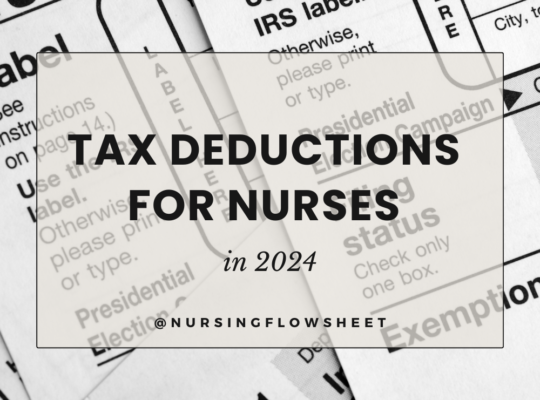As a nurse, the biggest expense you’re going to have is not your mortgage bill or your car payment. You know what it is? Taxes. As a middle class, we’re going to pay taxes on everything: Get a sign on bonus: TAXED! Get a raise at work: TAXED!
Now that the tax season is upon us, it’s best to think of ways on how you can lower down your taxes. I mean, we all know that *Billionaires* can get away with paying 0 taxes because of their assets and an army of attorneys and accountants to help them.
But you & me, if we try to pay ZERO taxes- we going to jail! LOL.
So, here are some ways you can lower your taxes LEGALLY.
Related: Read Tax Deductions for Nurses in 2024
Disclaimer: As always, please consult with your own tax preparers or accountants.
10 ways to pay less taxes as a nurse who works full time

1. Retirement Accounts
Tax-deferred retirement plans the biggest tax deduction I see most nurses routinely miss out on. A lot of nurses I know don’t max out their retirement plans available to them. Some simply don’t save enough money and others simply don’t realize just how much money they can put in these accounts for huge tax benefits.
In 2023, the maximum allowed for retirement contribution is $19,500 per person. The higher your income, the more tax you need to pay. By contributing to the tax-deferred retirement account such as 401(k) and 403(b), you may be able to enter a lower tax bracket.
The money you put in this tax-deferred retirement account is subject to tax when you withdraw it after your retirement. However, the tax rate will be most likely lower after your retirement as compared to that while you are employed since your income is usually lower after you retire.
2. Contribute to the Flexible Saving Account (FSA)
The flexible saving account is an account that you can use for medical expenses. You can also have dependent care FSA that can be used to pay for eligible dependent care costs such as preschool and summer camp, and healthcare cost such as medical, dental and vision care expenses.
Maximum contributions for FSA in 2021 is $3050.
Keep in mind though that the funds in these accounts are use it or lose it.
3. Use Health Saving Account (HSA)
Health saving account (HSA) could be another way to save money on tax if you and your family are in a good health condition and you don’t foresee any big health cost. In order to be eligible for HSA, you need to be enrolled in a high-deductible health plan (HDHP) . The money you put in this saving account CAN BE INVESTED.
The HSA contribution limits for 2023 is $3,850 for self-only coverage and $7,750 for family coverage. The contributions are not subject to federal income tax at the time of deposit and can roll over and accumulate year to year if they are not spent (unlike the FSA)
READ: Flexible Spending Account (FSA) vs Health Savings Account (HSA)
4. Invest Long Term (Capital gains Tax)
Short-term capital gains are taxed at a much higher tax rate than long-term capital gains. This is why I always advocate for long -term investing because it does have some tax benefits.
Warren Buffet’s strategy in investing which made him a billionaire is to buy and hold stocks.
If you have to sell, sell losers and you can carry over that loss to cancel out future capital gains and lower your taxable income. This is called TAX LOSS HARVESTING (another strategy to lower down your taxes by selling your stocks for a loss) The way to do this is to sell a losing investment, and you buy one that is highly correlated to the one you sold.
For example, you might sell the VTSAX and buying VFIAX. These two funds generally move in lockstep, but they are different investments.
You can deduct up to $3,000 a year of investment losses against your ordinary income.
5. Fix your W4 Payroll Setting
W4 forms are so intimidating especially if it’s your first time filling it out, so I will link this article that talks about what a W4 Form is what you need to put in there.
Sometimes, if you owe money to IRS when you file IRS, you are charged with “underpayment penalty” which automatically adds to balance due. This adds up so make sure you check with your payroll settings.
6. Claim dependent credits
This is for my fellow parents. #taxdeductionlove
For each qualifying child, you can have up to $1,000 child tax credit with the adjusted gross income (AGI) threshold at $75,000 for single filers, $110,000 if married filing jointly, and $55,000 if married filing separately.
7. Invest in Real Estate
Investing in real estate has great tax benefits. First and foremost is the depreciation from real estate shelters income from tax. For example, a $200,000 building depreciated over 27.5 years provides tax shelter of $7,272 per year. This will save you almost $2000 in taxes from depreciation of real estate.
However, there are pros and cons with owning real estate. Cue: dealing with tenants, house maintenance and repairs. So, do your homework.
If you own a house, you can also claim homeowners credit: If you make your home more energy efficient through new insulation, windows, doors, and roofs in the prior year, you may qualify for a tax credit on your federal income tax return. IRS website provides details on which credit and how much you can take.
8. Deduct educational expenses
I know a lot of nurses who are furthering their education getting their MSN or DNP. You may be able to deduct up to $2,500 of the interest you paid on a qualified student loan. The deduction is claimed as an adjustment to income. You may also deduct qualified education expenses for higher education paid during the year for yourself, your spouse or your dependent. In addition, you may deduct work-related education expenses from your income.
If you paid qualified tuition and required enrollment fees at an eligible educational institution, you can claim the tax credit for up to $2,000 as the lifetime learning credit, if your income meets certain requirements.
9. Donate to Charity
Any donations to a qualified charity are tax-deductible. If you are like me who like to declutter our house every year and donate items to goodwill, you can also declare these donations when you file your taxes. Turbotax’s It’sDeductible will help you figure the value of things you donate. You can also count the miles used to drive to and from your charity of choice.
10. Start a Business
Many nurses are starting to realize the power of our profession and the opportunities it presents to start our own businesses. Being self-employed has a lot of tax benefits because it can get you a lot of tax deductions.
If you are a sole proprietor, partner, or contractor, it would behoove you to keep careful records of your business expenses. Home office, travel, meals, accommodations, office equipment and supplies, medical equipment, CME expenses, licensing fees, communication expenses, board exam fees . . . the list goes on and on and on.
In conclusion,
The rule of thumb for reducing your tax is to lower your taxable income so you can get a lower tax rate. With a lower taxable income, you may also be able to qualify for more tax credits. There are some other ways to further reduce tax, such as making a donation to charity. Check out IRS credits and deductions for individuals for more information.








Best of luck!